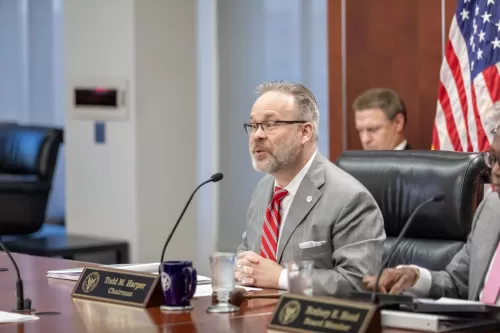NCUA Chairman Todd M. Harper during a meeting of the NCUA Board.
As Prepared for Delivery on October 19, 2023
Thank you, Pamela, for your presentation and your strong work on this proposed rule.
Thanks also to my colleague, Board Member Hood, for his leadership over the years on this important issue. When he chaired the NCUA Board, we approved a Second Chance Interpretive Rule and Policy Statement in 2019. That guidance provided individuals convicted of minor and non-violent criminal offenses with greater opportunities to work within the credit union industry.
As Board Member Hood stated when the policy statement was approved, “Expanding career opportunities for those who have taken responsibility for past indiscretions is consistent with our nation’s redemptive spirit.” I fully agree. And, I thank you for your foresight in being ahead of Congress in acting on this issue.
We’ve all made mistakes at one time or another, but far too many Americans still face hiring barriers due to criminal records resulting from those transgressions. In fact, more than 77 million people in the U.S. have an arrest or conviction record that could appear in an employment background check.
Many of these individuals are not violent or career criminals. They are people who made poor choices at some point and who have since paid their debts to society. What’s more, a disproportionate number of these individuals come from communities of color. If we are to advance financial inclusion and equity within the credit union system, we must facilitate the access of all demographic groups to credit union employment opportunities.
In 2022, Congress passed the Fair Hiring in Banking Act, which essentially codified several elements already found in the NCUA’s Second Chance policy statement. The act also directed the NCUA to consult with the Federal Deposit Insurance Corporation on implementation of the law. Following those conversations, the proposed rule before us is essentially a joint one. However, the NCUA’s proposal does, as Pamela noted in her presentation, consider the different regulatory and legal structures governing credit unions and banks.
The proposed rule would add a new part 752 to the NCUA’s regulations. It would also codify the agency’s policies and procedures related to consent applications. The proposed rule would additionally define what criminal offenses are covered by the regulation, such as criminal offenses involving the simple possession of controlled substances or other minor offenses. Further, the proposed rule would amend the NCUA’s rules governing the conditions under which newly chartered or troubled federally insured credit unions must notify the NCUA of proposed changes to their board of directors, committee members, or senior executive staff.
While I will support this proposed rule, I do have several questions for you, Pamela. First, in this proposal, we talk about employees. But, credit unions, especially smaller ones, are often run by volunteers. Also, directors serving on the boards of federal credit unions must be volunteers elected by their members. How would this proposed rule apply in those situations?
Thank you for clarifying that point. My next question is about credit union insurance and fidelity bond coverage. Did we discuss this proposal with providers to identify if there could be any unintended consequences with these changes, including increased costs to credit unions for fidelity bond coverage and directors’ and officers’ insurance?
Thank you. My last question is anticipatory in nature. What changes would need to be made to the agency’s guidance, delegations of authority, forms, and other processes to implement this proposed rule, assuming it is finalized as proposed?
Thank you, Pamela, for that response as well as for the work of you and several others on this proposed rule.
In working to provide access to financial services to people of modest means, credit unions should already be familiar with providing second chances, especially those credit unions that have worked with their members experiencing financial hardship. This proposed rule will allow credit unions to do the same for their employees and teams. Providing second chances is consistent with credit unions’ DNA and mission of meeting the credit and savings needs of people, especially those of modest means.
That concludes my comments. I now recognize Vice Chairman Hauptman.




